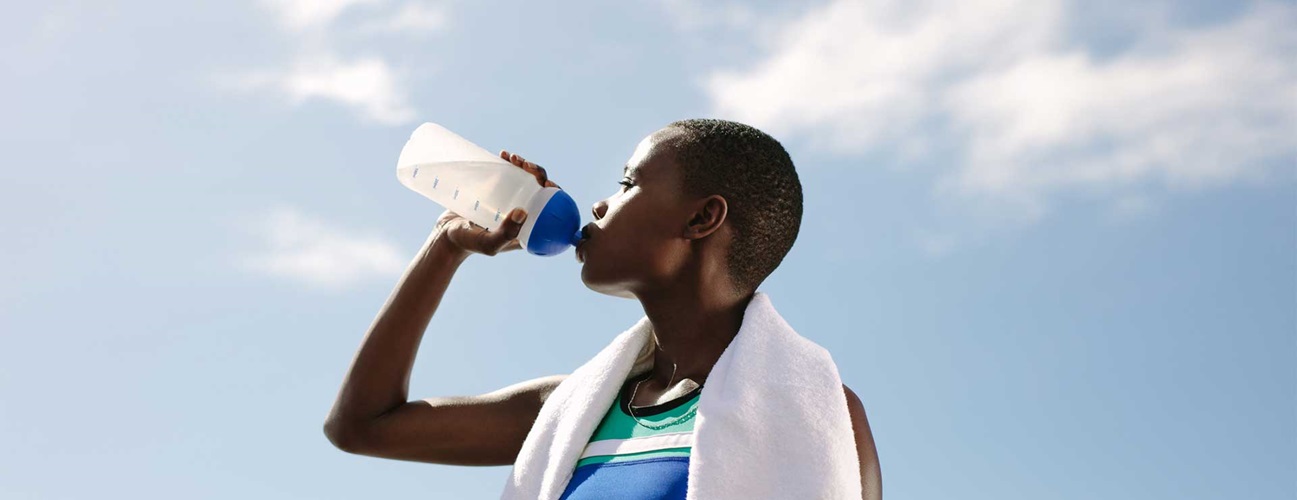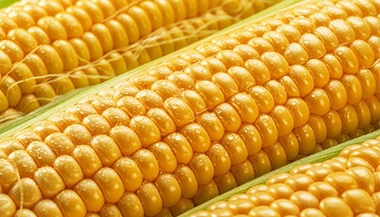Sports and Hydration for Athletes: Q&A with a Dietitian
Featured Expert:
Drinking enough water is important every day, but especially when sports are part of your routine, and you may need electrolytes as well. Rayven Nairn, M.S., R.D., L.D., a dietitian with the Johns Hopkins University Student Health and Wellness Center, answers some common questions about sports hydration, sports drinks and what’s best to drink ― and when.
Why is it important for athletes to stay hydrated?
Getting enough to drink before, during and after a sport or activity is essential. For every hour of activity, people can lose up to 2 quarts of fluid ― and salt along with it. Endurance activities, such as distance running and intense hiking and bicycling, can drain up to 3 quarts per hour.
“Hydration during a game, tournament or workout ― not just before and after ― can fall below the radar of an athlete and their trainer, but performance depends on it. Getting dehydrated puts you at risk of headaches, cramping and more serious complications like heat stroke or other heat disease.”
Does dehydration hurt your game?
“Dehydration is a heavy hitter when it comes to athletic performance,” says Nairn. Running low on water and electrolytes can affect:
- Athletic performance. Water cushions the joints, and being dehydrated can affect your flexibility and speed.
- Endurance. Hydration is essential for proper muscle function (including the heart muscles), and it helps you avoid cramps.
- Breathing. When you inhale, you need body fluids to moisten the air so it’s easier to absorb oxygen through your lungs.
- Mood. Your brain needs water to work. Just as a drop in blood sugar can make a person “hangry,” dehydration can affect mood and concentration and cause headaches and irritability.
What are electrolytes? Why do athletes need them?
Electrolytes include salt and minerals such as potassium, phosphate, calcium and magnesium. Maintaining electrolyte balance maximizes the performance of the body’s muscles, organs and joints. With the exception of bicarbonate, which the body can produce itself, electrolytes come from the food and beverages you consume.
“In terms of sports hydration, when we’re talking about electrolytes, we’re mainly talking about salt, plain and simple,” says Nairn. Salt is particularly important to help nerves transmit electrical signals to the muscles of the body, including the heart, and to help the body absorb nutrients into its cells.
Because electrolytes dissolve in water, levels can go down when the body loses water through elimination of waste (urine and stool), breath evaporation and sweating. Nairn notes these last two functions can be speeded up in people playing sports, which is why it’s important for athletes to be aware of their electrolyte intake during periods of activity.
Dehydration Symptoms
Dehydration can sneak up on both adults and children, especially when they’re exerting themselves. Waiting until you’re thirsty to grab a drink may be short-changing your hydration needs. Nairn says, “By the time you actually feel thirsty, it’s too late ― you’re already too low on fluids.”
Urine is another clue. Peeing less frequently or in smaller amounts is a clue to needing fluids, as is the urine’s color: “Ideally, your urine should be a pale, straw yellow color,” she says. “If it’s deeper yellow or golden, you’re likely dehydrated.”
Other symptoms of dehydration:
- Muscle cramping
- Fatigue
- Lightheadedness
- Dizziness
- Confusion
- Dry mouth and mucous membranes
- Increased heart rate and breathing
What should athletes drink to stay hydrated? And when?
Water, sports drinks, caffeinated beverages and even chocolate milk are some favorites among athletes. Nairn says they all can play a role in staying hydrated.
Water: Basic Hydration
Water is the most basic form of hydration, and certainly the least expensive. Nairn says sparkling water is just as hydrating as noncarbonated tap water.
“Athletes may get bored with water,” she observes. “To some extent, plain water is not always the best ― drinking too much water can dilute electrolytes. The goal is to maintain balance.
Along with water, eating your hydration is important. I recommend fruit, such as pineapple or watermelon, combined with sports drinks or water infused with electrolytes and water-soluble vitamins such as C and Bs.”
Sports Drinks
Sports drinks include commercially produced bottled or canned beverages that are designed to help you stay hydrated and replenished when you’re training, working out or playing a sport. Typically, they contain water, flavors, colors, electrolytes (chiefly salt) and sugar for energy, although zero-sugar drinks are also available.
There is a huge market for these products, and a lot to choose from. Electrolytes with flavorings are also sold in packets or tablets that can be added to water. Marathon runners may use gels that contain salt and sugar for energy. “You can also make your own sports drink by sprinkling 1/2 teaspoon of salt into a liter of water and adding a bit of sweetener, lemon or fruit to make it taste better,” Nairn says.
Sports drinks and electrolyte beverages can also make a person feel better if they are experiencing dehydration due to fever, diarrhea or vomiting.
Types of Sports Drinks
Depending on the balance of carbohydrates (sugar) and electrolytes, sports drinks fall into one of three categories:
- Isotonic drinks have approximately the same balance of carbohydrates and electrolytes as human blood. They are meant to restore electrolyte balance after sports that involve sweating and electrolyte loss. Most commercial sports drinks are in this category.
- Hypotonic drinks contain lower amounts of carbohydrates and electrolytes than the human body. These can be appropriate after a workout.
- Hypertonic formulas have higher amounts of carbohydrates and electrolytes than human blood. Electrolyte gels, with their higher concentration of sugar and salt, would be similar to these in composition. These can benefit people who do endurance sports, and are useful for replenishing stores of glycogen in the muscles that provide energy.
How to Choose a Sports Drink
Nairn advises reading the label to see what’s in the sports drink and ensure it meets your needs and preferences for carbs, calories and salt.
“Choose a drink based on how much salt you lose in your sweat, which differs from person to person. You may perspire very lightly or soak your shirt, leaving salt crystals, or find you’re somewhere in between.” Activities that involve wearing heavy gear or padding, such as football, can push sweating and fluid loss, especially in hot weather. There can be anywhere between 200 milligrams to 2,000 milligrams of salt in each liter of sweat.
Kids and adults handle water and salt loss differently. “While children are considered dehydrated after losing 1% of their fluid levels, adults can lose up to 2% before hitting that definition. Puberty makes a big difference in sweat output. It’s important to know that a teenager may sweat out fluid and electrolytes faster than they did as a child.”
“As a guideline, adults should aim for 200 milligrams of salt per 16-ounce serving of sports drink. A 12-ounce bottle should have at least 150 milligrams,” Nairn says.
In terms of sugar, the drink should contain 6% to 8% total carbohydrates for energy replacement.
Other Types of Drinks for Athletes
- Coconut water and sports drinks made with it are not at the top of Nairn’s recommendation list. “Coconut water is high in potassium, but this electrolyte is not one that people lose a lot of through perspiration. It’s the salt that needs to be replenished.”
- Caffeine is an ingredient in some sports and energy drinks, and some athletes like to drink coffee or other caffeinated beverages a few hours before a game or workout to boost their energy. “That’s not a problem,” Nairn says, but she cautions, caffeine can upset the stomach and stimulate the bowel, necessitating an unplanned trip to the bathroom.
- Chocolate milk. Chocolate-flavored whole milk provides fats that can help lessen the impact of post-exercise inflammation, and the protein can help in recovery.
Sports Hydration: A Sample Plan
Here’s a guideline of what you should drink for every 20 minutes of sports play:
- Adults: 6 to 12 ounces
- Teens (age 13 to 18): 11 to 16 ounces
- Kids (age 9 to 12): 3 to 8 ounces
As far as what to drink before, during and after your practice, workout, game or tournament, Nairn recommends:
- Before: Have 24 ounces of sports drink or electrolyte-infused water two hours before the activity.
- During: If the activity is going to go on for more than 45 minutes (adults) or more than an hour for kids, make sure you’re using a sports drink and not just plain water to hydrate.
- Afterward: Drink 16–24 ounces of water or hypotonic sports drink, depending on how much you’ve sweated ― Nairn says the ideal goal is 24 ounces per pound lost. This is also a good time for chocolate milk.
Is it possible to drink too much electrolyte?
Nairn says that in general, drinking large quantities of electrolytes does not put healthy people in danger. That’s because they are water soluble. “What you don’t use passes through the body in the urine,” she explains.
However, people who have very high blood pressure or kidney problems should check with a doctor or dietitian to ensure they are not getting too much salt.
Some sports drinks have a high sugar content, which can add calories and increase the risk of obesity if they are overconsumed, particularly by children and people who are not expending calories through exercise.
Stay Motivated to Stay Hydrated
To help you stay on top of your hydration needs, Nairn says a good tip is using “motivational” water bottles that have water levels marked with time intervals to remind you to drink enough water throughout the day.
She also notes that parents, coaches and trainers can use a little psychology to encourage athletes to drink more water and electrolytes: “Tap into their competitive spirit,” she advises. “Stress to players and clients that if they’re not hydrating, their performances will suffer ― this motivates them.”







